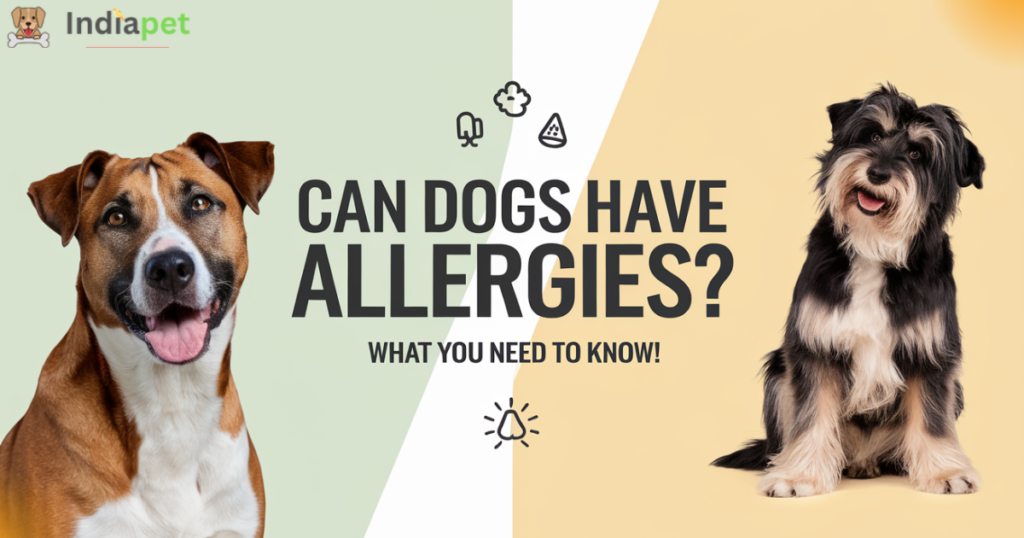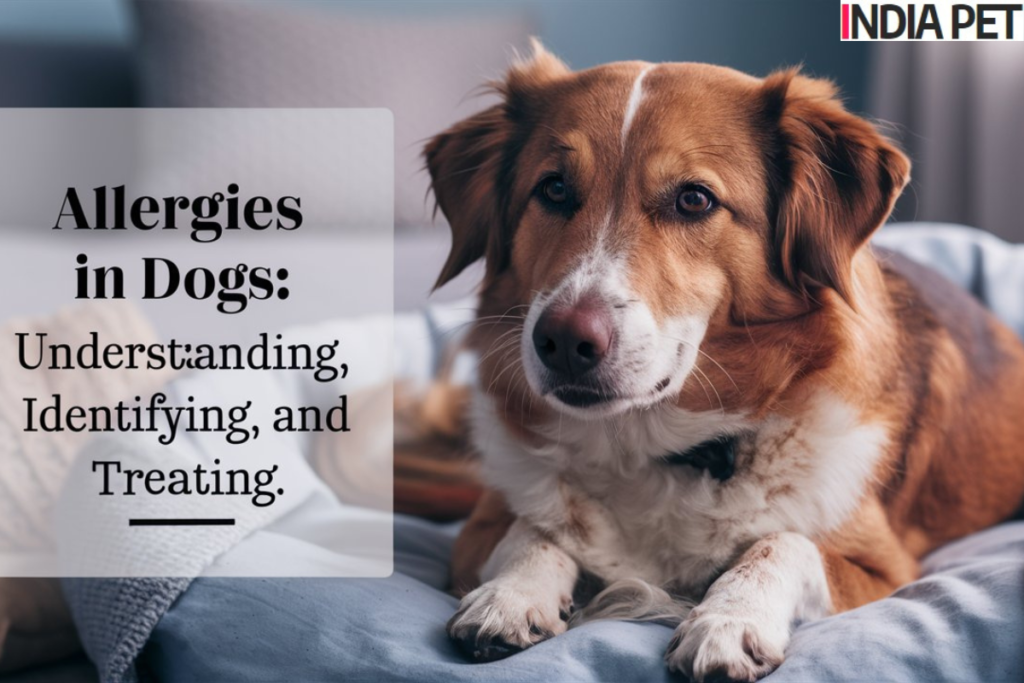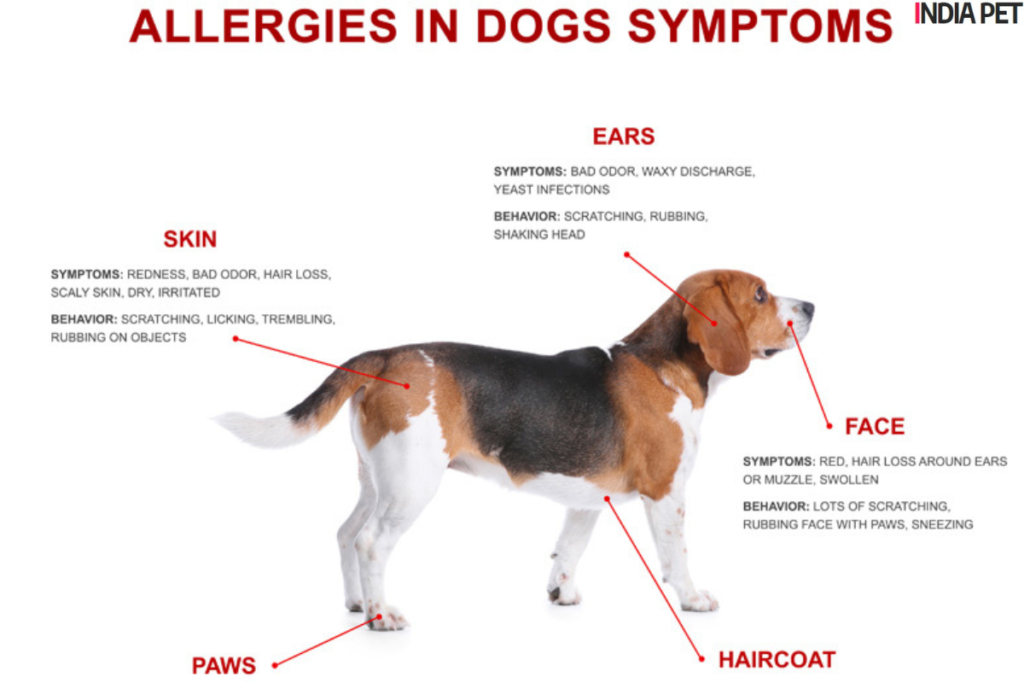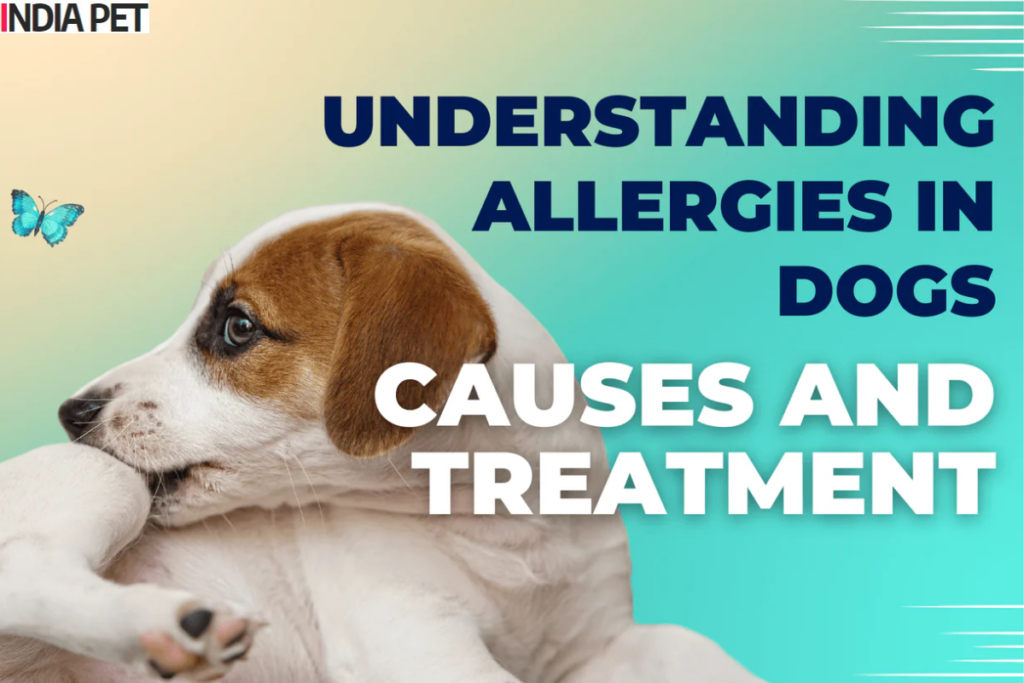Allergies in Dogs: Understanding, Identifying, and Treating-Allergies in dogs, like in humans, can cause a range of symptoms and discomforts. They can result from various sources, and understanding them is crucial for maintaining your dog’s health and happiness.
This blog will delve into the different types of dog allergies, their signs, causes, and treatment options, providing a comprehensive guide for pet owners.
What is an Allergy?
In simple terms, it means an excessive reaction by the immune system to a substance that is normally harmless to most people.
This disease occurs when a dog’s immune system overreacts to substances known as allergens that are normally harmless. These can trigger an allergic reaction if ingested, inhaled, or come into contact with a dog’s skin. If your dog is having skin allergies, your vet can help!
During this reaction, the dog’s body exhibits a variety of physical symptoms. The severity of these reactions can vary greatly, from mild discomfort to severe, life-threatening conditions.
Some common allergens for dogs include 1:- Flea saliva and bites, pollen, grass, weeds, mold spores, dust particles, and certain foods.

Can Dogs Have Allergies?
Allergies are common in dogs and it can be caused by many things, and the answer is yes, dogs can also have allergies just like humans, These allergies can be triggered by a variety of factors in dogs, including environmental elements such as mold and dust, mites, pollen, certain foods, fleas, and even ingredients in their grooming products.
Allergies in Dogs
Types of Allergies in Dogs
- Environmental Allergies (Atopic Dermatitis)
- Causes: Pollen, dust mites, mold, and other environmental allergens.
- Symptoms: Itchy skin, watery eyes, sneezing, and ear infections.
- Food Allergies
- Causes: Specific proteins or ingredients in dog food, such as beef, chicken, dairy, or grains.
- Symptoms: Digestive issues (vomiting, diarrhea), itchy skin, ear infections.
- Flea Allergies (Flea Allergy Dermatitis)
- Causes: Flea saliva triggers an allergic reaction.
- Symptoms: Intense itching, redness, hair loss, and secondary infections.
- Contact Allergies
- Causes: Chemicals, plants, or materials that come into direct contact with the dog’s skin.
- Symptoms: Redness, itching, swelling, and rash at the contact site.
- Drug Allergies
- Causes: Certain medications or vaccines.
- Symptoms: Hives, swelling, vomiting, diarrhea, or anaphylactic shock in severe cases.
Signs of Allergies in Dogs
Here are some more symptoms to look out for:-
- Itching and Scratching: Persistent itching, especially around the face, ears, and paws.
- Red, Inflamed Skin: Areas of redness, rash, or swelling.
- Ear Infections: Frequent ear shaking or head tilting, and a bad smell from the ears.
- Digestive Issues: Vomiting, diarrhea, or changes in stool consistency.
- Hair Loss: Patchy or widespread hair loss due to itching and scratching.
- Watery Eyes and Sneezing: Signs of respiratory allergies, especially with environmental triggers.
- Lethargy and Behavioral Changes: Unusual tiredness or irritability due to discomfort.
“At Indiapet, website we provide the latest updates on the care and health of all Pets, dogs, and cats. All information is thoroughly researched, verified by experienced veterinarians, sourced from trusted websites and reports and updated regularly to ensure the most accurate and up-to-date content for our readers.”
Causes of Allergies in Dogs
- Genetics: Some breeds are more predisposed to allergies, such as Bulldogs, Terriers, and Dalmatians.
- Environmental Factors: Pollens, dust mites, and mold are common triggers for environmental allergies.
- Food Ingredients: Proteins and grains are frequent culprits in food allergies.
- Parasites: Fleas are a significant cause of allergic reactions in many dogs.
- Chemicals and Materials: Household cleaners, certain fabrics, or plants can cause contact allergies.
Treatment of Allergies in Dogs
Treatment for dog allergies depends on the type and severity of the allergy, and may include the following:
- Identify and Avoid Triggers
- Environmental Allergies: Keep your dog’s environment clean, use air purifiers, and limit exposure to known allergens.
- Food Allergies: Switch to a hypoallergenic or limited-ingredient diet, avoiding known allergens.
- Flea Allergies: Implement a consistent flea control program and treat all pets in the household.
- Contact Allergies: Avoid contact with allergens, such as certain plants or cleaning products.
- Medications
- Antihistamines: These can help alleviate mild allergy symptoms.
- Steroids: For more severe cases, corticosteroids can reduce inflammation and itching.
- Immunotherapy: Allergy shots or oral tablets that desensitize the dog to specific allergens.
- Topical Treatments
- Medicated Shampoos: Helps to relieve itching and cleanse the skin.
- Anti-Itch Sprays or Creams: Provides relief directly to affected areas.
- Dietary Adjustments
- Elimination Diet: Identify and remove specific allergens from your dog’s diet to find a suitable food.
- Novel Proteins: Use proteins that your dog hasn’t been exposed to previously.
- Regular Vet Visits
- Allergy Testing: Helps in identifying specific allergens through blood tests or skin tests.
- Treatment Plans: Regular check-ups for managing ongoing allergy treatments and adjustments.
What are the most common allergens for dogs?
Dogs can be sensitive to a variety of allergens, including:
- Mold spores
- Food ingredients
- Pollen
- Fleas
- Dust mites
- Household cleaning products
- Fabrics
- Perfumes and deodorants
Conclusion
Allergies in dogs can be challenging to manage, but with proper understanding and treatment, you can help alleviate your pet’s discomfort. Recognizing the type of allergy, its signs, and the causes are critical steps in addressing the issue.
From avoiding allergens and using medications to making dietary changes, there are various strategies to treat allergies effectively. Allergies in Dogs: Understanding, Identifying, and Treating Regular veterinary visits are essential for tailoring the treatment to your dog’s specific needs.
By staying informed and proactive, you can significantly improve your dog’s quality of life and ensure they remain happy and healthy despite their allergies in dogs.
The website certainly does not guarantee 100% accuracy of the figures. The above information is taken from Google and various websites/news media reports.
You can follow Indiapet on Twitter, Facebook, Instagram and Google News. Visit indiapet.in for the latest news, reviews and tech guides. In my previous blog on building the beautiful types of ducks with picture, I ended the post by linking to one of our ultimate.
FAQs
How can I tell if my dog has allergies?
Common signs of allergies in dogs include excessive itching, redness, ear infections, and digestive issues. Observing patterns related to their environment or diet can also provide clues. If you suspect allergies, consult your veterinarian for a proper diagnosis and treatment plan.
Can allergies in dogs be cured?
While allergies in dogs cannot always be completely cured, they can be managed effectively. Treatments focus on minimizing symptoms and avoiding triggers. Your vet will guide you through the best strategies to control and manage your dog’s allergies.
Are there any natural remedies for dog allergies?
Some natural remedies include using omega-3 fatty acids to improve skin health, trying oatmeal baths for itching, and incorporating hypoallergenic foods into their diet. However, it's crucial to consult your vet before starting any new treatments.
How often should I take my dog to the vet for allergies?
Regular vet visits are essential, especially if your dog’s symptoms are persistent or worsening. Your vet may recommend more frequent check-ups during the initial diagnosis and treatment phases, with adjustments based on your dog’s response to the treatment plan.
- Common allergens for Dogs Source is American Kennel Club ↩︎




![10 Most Photogenic Dog Breeds [UPDATED 2025]](https://indiapet.in/wp-content/uploads/2024/07/10-Most-Photogenic-Dog-Breeds-4-150x150.png)